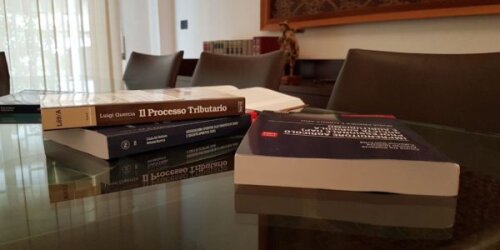Best Tax Lawyers in Bari
Share your needs with us, get contacted by law firms.
Free. Takes 2 min.
List of the best lawyers in Bari, Italy
About Tax Law in Bari, Italy
Tax law in Bari, Italy, is governed by both national regulations and local ordinances. Italy has a comprehensive tax system, including income tax, corporate tax, VAT, and several other local taxes. In Bari, as in the rest of Italy, tax regulations aim to ensure compliance, fund public services, and promote economic stability. Taxpayers in Bari are subject to Italian national tax laws, but specific local tax regulations and rates may apply, affecting businesses and individuals differently depending on their economic activities and residency status.
Why You May Need a Lawyer
There are multiple situations where seeking the expertise of a tax lawyer in Bari can be beneficial. Common scenarios include understanding the complexity of tax obligations if you own property or run a business, resolving disputes with tax authorities, estate planning, and legal representation in cases of alleged tax evasion or fraud. Furthermore, expatriates or non-residents may face additional challenges in navigating tax obligations both in Italy and their home country, making legal advice indispensable.
Local Laws Overview
Bari, like the rest of Italy, follows the national tax code but may have specific local tax implications. Key local aspects include municipal property tax, additional income tax (addizionale IRPEF), and waste tax (TARI). Businesses should be aware of regional incentives and deductions available for specific industries. Local tax authorities in Bari also implement compliance measures and audits to ensure accurate declarations and payments. Staying informed about recent tax law amendments and local ordinances is crucial for compliance and effective tax planning.
Frequently Asked Questions
What are the main types of taxes in Italy?
The primary taxes include income tax for individuals (IRPEF), corporate income tax (IRES), VAT (IVA), regional tax on productive activities (IRAP), and municipal property tax (IMU).
How are tax rates determined in Bari?
Tax rates are primarily determined by national laws, but some local taxes, such as the additional IRPEF and IMU rates, can be set by municipal authorities like those in Bari, within the bounds of national regulations.
When is the tax year in Italy?
The tax year in Italy aligns with the calendar year, running from January 1 to December 31.
How can I pay my taxes in Bari?
Taxes can be paid through various methods, including direct bank transfer, online payment through the Italian Revenue Agency's website, or at local post offices using payment slips provided by your accountant or tax advisor.
What happens if I fail to pay my taxes on time?
Failure to pay taxes by the due date can result in penalties and interest charges. Persistent non-compliance may lead to legal proceedings or asset seizures by tax authorities.
Can I appeal a tax decision in Bari?
Yes, taxpayers have the right to contest tax assessments or decisions. The appeal process involves several stages, starting with an application to the tax commission, and may require legal representation.
Are there tax incentives available in Bari?
Yes, certain sectors may benefit from incentives like deductions for energy-saving measures, incentives for start-ups, or reduced rates in specific industries. Consulting with a local tax expert can identify applicable incentives.
Do expatriates have different tax obligations?
Expatriates may have distinct tax obligations based on their residency status and income origin. Italy has tax treaties with many countries to prevent double taxation.
What documentation do I need for tax filing?
Necessary documents include income statements, receipts for deductible expenses, property ownership details, and any relevant financial records. For businesses, additional documentation on operations and expenses is required.
How can I ensure compliance with local tax laws?
Ensuring compliance involves staying informed about legislative changes, maintaining accurate records, and often consulting with accountants or tax lawyers who understand local regulations and can provide customized advice.
Additional Resources
For further assistance, consider consulting the following resources: the Italian Revenue Agency (Agenzia delle Entrate), the Bari Chamber of Commerce, professional associations like Ordine dei Commercialisti, and local tax consultancy firms. Visitor centers within municipal offices can also offer guidance on regional tax regulations.
Next Steps
If you require legal assistance in tax matters, it is advisable to seek a qualified tax lawyer or consultant familiar with both Italian and local Bari tax laws. Start by researching legal professionals specializing in tax law in Bari, requesting initial consultations to discuss your specific needs. Organizing your financial records and having clear questions or concerns will help make your consultation more productive. Additionally, staying updated with tax reforms and deadlines will aid in effective financial planning and compliance with legal obligations.
Lawzana helps you find the best lawyers and law firms in Bari through a curated and pre-screened list of qualified legal professionals. Our platform offers rankings and detailed profiles of attorneys and law firms, allowing you to compare based on practice areas, including Tax, experience, and client feedback.
Each profile includes a description of the firm's areas of practice, client reviews, team members and partners, year of establishment, spoken languages, office locations, contact information, social media presence, and any published articles or resources. Most firms on our platform speak English and are experienced in both local and international legal matters.
Get a quote from top-rated law firms in Bari, Italy — quickly, securely, and without unnecessary hassle.
Disclaimer:
The information provided on this page is for general informational purposes only and does not constitute legal advice. While we strive to ensure the accuracy and relevance of the content, legal information may change over time, and interpretations of the law can vary. You should always consult with a qualified legal professional for advice specific to your situation.
We disclaim all liability for actions taken or not taken based on the content of this page. If you believe any information is incorrect or outdated, please contact us, and we will review and update it where appropriate.








